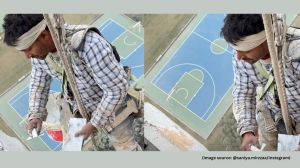Dead, alive, or just missing?
If sepia is the colour of absence, then 35-year-old Sabira Khatoon's life since December 27 has been awash in it. Her existence, as she swa...

If sepia is the colour of absence, then 35-year-old Sabira Khatoon8217;s life since December 27 has been awash in it. Her existence, as she swabs the floors of seven flats in the South Delhi neighbourhood of Soami Nagar, comes back to her in a series of flashbacks.
She remembers the cycle rides to the doctor when the children were ill, and those special outings to watch the tazias as they wound their way through the streets of Nizamuddin.
8220;I have no future, only the past,8221; she says. And a present, full of waiting. It was on the night of December 27 that she last saw her husband, Omar Ali. She has this memory of him stepping into their small tenement, one of 150 others in the Jhuggi-Jhopadi Camp near Soami Nagar. A whiff of liquor hung to him, but she could tell that he was not dead drunk as he sometimes was. It was around 11 p.m., and her youngest daughter five-year-old Tabassum stirred in her sleep. The little one was used to her father giving her a sweet or some loose change whenever he came home from working at the kabadi shop, so she called out: 8220;Papa, paise do.8221; Ali told the child to hush, go to sleep, and that he was just getting the money for her.
He didn8217;t say anything to his wife. He then stepped out of the house into the darkness that encompassed it and into oblivion. It was as if his existence was neatly erased from the logbook of human lives. No one who knows him saw him after that cold December night.
The neighbours, of course, are sympathetic. For a few days after Ali8217;s disappearance they helped search for him. But, as one old lady who lives in the adjoining hut put it, what can be done if someone disappears just like that? 8220;Police log have not been able to find him, what can we poor people do?8221; she asks resignedly. When asked if Ali drank too much, she says: 8220;Who doesn8217;t drink? But he troubled no one. He wouldn8217;t say chu to a cat.8221; She feels for Sabira: 8220;Poor thing. Three daughters to look after. How hard she works.8221; A young man listening to the conversation observes philosophically: 8220;Even the loss of a needle hurts. How much more would it be if it were a jeevansathi?8221;
But with all their sympathy they will never know the full hopelessness that Sabira carries with her like an ulcer, everyday, as she works her life out in her memsahibs8217; flats, scrubbing and swabbing, sweeping and washing. It8217;s with her when she fills buckets at the nearby hand pump, when she rolls out rotis for the evening meal. Even sleep is no release because of the nightmares that come with it.
If she learnt that Ali had died, a certain reconciliation could set in over time. But even this is denied to her. It is a cat-and-mouse game of death in life and life in death. 8220;I don8217;t know if he8217;s dead. I don8217;t know if he is living,8221; says Sabira. And it8217;s not for lack of trying. She has scoured the mortuaries of public hospitals, visited innumerable police stations, gone through numerous lists. She8217;s been to Tihar Jail, to check if Ali didn8217;t get thrown in there by some chance.
Her desperation even drove her to places where wishes are believed to come true if a coin is thrown into a well. Or if it stayed stuck to a wall. One group of mullahs and pandits have assured her that her husband lives, others fear the worst. Says Sabira: 8220;One pandit told me to light a diya for three days. If the flame goes out, it means that my husband is dead.8221;Sabira, even as she follows these instructions faithfully, believes that Ali will return some day. But there are moments when she suspects the worst. Her worst fear is that he has got done in by a neighbour whom he had associated with very closely.
She has learnt that he won some Rs 7,000 in a lottery around the time he disappeared, and fears that his friend robbed him of it and finished him off in the process.
She has even put the name of the man in her statement to the police, but nothing, of course, has come of it, apart from the suspect threatening to break every bone in her body if she persists with the inquiry.
And so the days go by. For Sabira, with four children to look after, there can be no respite. Through all these days of misery she has not missed one day of work, one of her employers reveals with a touch of admiration. The fact is she cannot. It is she who has to feed the children now and keep their lives going. The youngest still insists that she be taken to abba, but children, thankfully, are easy to distract. In a city like Delhi, Sabira Khatoon8217;s experiences, even as it threatens to tear her apart, get lost in the whorl of numerous other catastrophies. It is just one more story. One more statistic. 8220;Madam,8221; says the in-charge, Missing Persons8217; Record office, 8220;In Dilli alone, 50 persons get disappeared every day. Hundreds in all-India are reported missing.8221; It8217;s difficult not to get the gist of what she says. When so many get lost, what is one more?
Maxwell Pereira, Deputy Commissioner of Police, takes more time to explain.8220;It8217;s social tensions of various kinds that cause such disappearances. Men, among the poor, disappear mostly because of marital incompatibility or financial problems.8221;
But what if Ali is the victim of murder? Pereira doesn8217;t dismiss the possibility outright, but indicates that it will be difficult to prove it. 8220;Every day, numerous dead bodies surface. We try our best to tally them with lists of missing people, but it is extremely difficult to keep track. As a matter of course, corpses are dumped in the border areas of States to elude the law.8221; It appears that there8217;s very little the police can do about such a phenomenon.
8220;Yes, desertion is a common experience for women, especially in slum areas,8221; says Abha Chauhan, founder-member, Jagori an organisation which addresses domestic violence. 8220;Husbands desert their families and sometimes start a new life with another woman. Sometimes they come back after a long time. Sometimes, as in this case, they disappear without a trace.8221; But the women cope. Says Chau-han: 8220;It8217;s amazing, how powerful some of these women are. They come from rural areas and quickly acquire the skills required to survive in a city. They learn the ropes. How to get water. How to get a ration card. How to protect themselves and their children from violence. How to keep hunger at bay.8221;
Sabira Khatoon, who came 20 years ago from rural Bihar to Delhi, has learnt these lessons. She is also learning another that is not in the script. How to cope with a husband who is not dead and who is not living.
- 01
- 02
- 03
- 04
- 05































